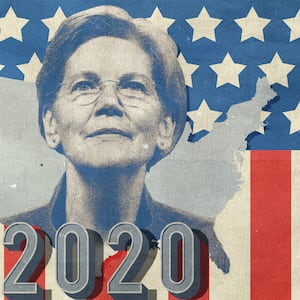When Elizabeth Warren announced her presidential campaign on New Year’s Eve, she also launched a discussion about misogyny and media.
This happened because a common observation of Warren is that she’s simply not likeable enough to win the presidency.
To some, this is a problematic opinion. Even acknowledging the existence of this perception, they suggest, is a sexist structural obstacle created by the patriarchy to keep strong women in their place.
I’m a conservative, so I don’t really worry about whether I’ve offended liberal feminists. I don’t have a problem saying that Warren is unlikeable. She seems preachy and angry to me. Actually, she’s a combination of some of the horrible math teachers I endured in middle school, and a friend’s overly emotional mom.
This might sound pretty specific, but we’ve all met people like Warren. She’s an archetype of a genre that I’m pretty sure would turn off a lot of voters. What is more, she increasingly looks like a phony—a problem she is reinforcing by trying to copy Alexandria Ocasio Cortez’s Instagram game.
This is not an indictment of powerful women, but of Elizabeth Warren. I’m a fan of Nikki Haley. And though I’m no more ideologically simpatico to Nancy Pelosi, Krysten Sinema, or AOC than I am to Warren, the aforementioned progressive women seem kind of charming to me.
Yes, even Pelosi. First, above all else, you have to respect her. Second, let’s be honest, she’s stylish and glamorous—and who doesn’t like that? Pelosi serves up a pretty effective one-two punch of commanding respect and then charming you after she gets what she wants. Warren, by my estimation, fails to deliver on either front.
To be fair, it may be that this adjective (likeable) is applied more to women than it is to men. But everyone experiences some type of unfair bias on a daily basis. Each of us is constantly judged by the immediate impressions of others. They decide if they like us or trust us based not our résumés, but rather on some amalgam of information based on looks and perception.
Male candidates are judged by likeability, too. We may call it “charisma,” or talk about it in terms of which guy we’d rather have a beer with. But it’s the same thing. When two men are running against each other for office, is it fair that the taller candidate almost always wins, or that a full head of hair may be worth a point (or two)? When we attribute leadership qualities to politicians, who knows what arbitrary factors influence us?
Consider all the grief Ted Cruz has received about his sanctimonious personality. Consider a column I wrote a few months ago, in which I declared that “I’d rather have a beer with Beto—and I suspect most of my friends would, too.” You may criticize this as superficial horse-race analysis, but you can’t call it “sexist.”
Likeability has always mattered. George H.W. Bush was more experienced but less likeable than Bill Clinton. John McCain was more experienced but less likeable than Barack Obama. This is not a new problem discovered just to keep unlikeable women from higher office.
Speaking of which, the expression “higher levels, bigger devils” may be part of the story. It might be that the likeability question is confronting women more of late simply because we are seeing more viable female candidates running to be president.
Still, there is a sense that this is a new phenomenon and that, when it comes to Warren, at least, we ought to be focused on things that matter, like her experience and worldview.
On MSNBC Wednesday night, Chris Hayes urged viewers to ignore “shallow, quick takes on optics and electability.” It was a reasonable thing to urge, but it suggested (to me at least) larger, unstated questions: Should the media acknowledge that voters have certain negative perceptions about female politicians? Does the merely acknowledging only perpetuate negative stereotypes? In other words, should media be focused on telling the truth about the present or in social-engineering the future?
Perhaps you remember that controversial moment during the 2008 Democratic primary, when Barack Obama said, “You’re likeable enough, Hillary.”
Few people remember the setup to that exchange, but the question was premised on findings by the University of New Hampshire Survey Center that voters viewed Clinton as more experienced, yet less likeable, than Obama.
It’s impossible to know whether Hillary Clinton would have been a better president than Barack Obama, but one thing we do know is that Obama went on to serve two terms as president.
It’s pretty clear to me that the likeability factor was a big part of that—which is why I think it’s a perfectly legitimate attribute for the Democratic voters to factor in when making their decisions.
If you really believe that Donald Trump poses an existential threat to democracy, then you owe it to your side to nominate someone who can actually win the Electoral College map. The real question Democrats should be asking themselves in 2019 isn’t “How do we make things easy for Elizabeth Warren?” but rather, “Who do we need to nominate to beat Donald Trump in Wisconsin?”







